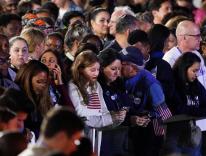It is difficult to think how an election could be more bizarre. An incumbent president’s dropping out of the race just months before election day. His replacement? Potentially the first woman and first Asian American president in U.S. history. Her challenger? A twice-impeached former president who tried to illegally overturn his last election, and who, in the months leading up to this one, was convicted of multiple felonies, survived two assassination attempts, and openly mused about using the military against his fellow Americans.
Yet for all its strangeness, the election itself was fairly predictable: a deeply polarized electorate divided into two camps of roughly equal size, a presidential race hinging on slices of voters in a half-dozen familiar states, and control of Congress coming down to a handful of swing seats among the 468 actually appearing on ballots. It is remarkable how familiar 2024 ended up looking.
In the Rust Belt and Upper Midwest, where I live, the so-called blue-wall states of Wisconsin, Michigan, and Pennsylvania were once again decisive. They doomed Clinton in 2016, rallied for Biden in 2020, and turned back to Trump this time. Here in Iowa, Ann Selzer’s famous poll for the Des Moines Register, which has had a strong record for accuracy in the past, briefly gave Democrats hope that a big shift not detected in other polls, especially among older white women, would propel Harris to victory here and across the rest of the region. It was not to be.
As usual after elections, there will be lots of theories about what pushed Trump and Republicans over the line while Harris and the Democrats fell short. This makes sense, since many factors can make a difference in elections. And the Democratic Party will have to do the hard work of examining how to broaden its appeal to more voters, especially the majority of Americans who do not have college degrees.
But to my mind, the biggest factor is the most obvious. It has long been the case in democracies that inflation is political poison. Incumbent parties that have presided over rapidly rising prices, even if the rate of inflation eventually comes back down, usually pay a price. After the global inflation surge that followed the pandemic, and the higher interest rates put in place to combat it, we have seen voters punish incumbent parties and coalitions—right, left, and center—in Australia, Austria, Belgium, Botswana, Finland, France, India, Japan, New Zealand, Portugal, South Africa, South Korea, Sweden, and the United Kingdom. Indeed, 2024 is shaping up to be the first year in history that every single incumbent party going before voters in developed countries has lost vote share going all the way back to 1905, when such data was first collected. The United States was next in line.
An underappreciated factor in political success is luck, and Trump was lucky to recapture his party’s nomination in a cycle where its candidate would enjoy a strong tailwind. According to the exit poll data we have so far, two-thirds of voters rated the economy as “not good” or “poor,” and Trump won 70 percent of these voters. This, more than any other factor, explains why Trump improved his vote share compared to 2020 so uniformly across most demographic groups and in forty-eight of the fifty states.
Underneath the election’s overall predictability, however, we still saw some notable trends. The results should finally put to rest the idea that the country’s shifting demographics—specifically its becoming more secular and racially, ethnically, and religiously diverse—will somehow automatically benefit Democrats.
White Christians, especially Evangelicals who attend church frequently, remain key to the GOP’s success, but Trump and his party still do well enough with other religious groups, especially white Christians who only rarely attend religious services. This should not be surprising since Europe has shown that right-wing populist, anti-immigration political parties can do just fine even in highly secular societies.
Even more significant is race. No Democratic presidential candidate has received the majority of white votes since African Americans won their own voting rights in 1965, leaving the party needing minority voters to win elections. Even as the country’s changing demographics have made white nationalists ever more visible and influential within the GOP, large and diverse (including politically diverse) Black, Latino, and Asian populations have provided an increasingly important source of GOP votes as well.
While this year’s breakdown of Black and white voters is actually not that different from the last two presidential elections, a longer view shows Harris’s 85 percent of the Black vote around 8 to 10 points lower than Obama’s in 2008 and 2012, most of which has come from erosion among Black men. For Asian and Latino voters, Trump has improved his totals across the last three elections to reach 39 percent Asian support and 46 percent Latino support this year.
Given its size and rate of growth, the Latino electorate is particularly interesting, especially in light of Trump’s anti-immigrant and white nationalist appeals. Most Latino voters still support the Democratic ticket, and many who vote for the GOP do so for lots of reasons that have nothing to do with immigration or race (recall inflation’s crucial drag on Democrats this year). And, of course, almost all Americans who support anti-immigration policies are themselves descended from immigrants, which can be as true of Latinos as anyone else. It is also important to realize that many Latinos, including the majority in some polls, identify as white. This means that at least some can be receptive to the same racial appeals as other white voters. Enrique Tarrio, the erstwhile chairman of the violent white nationalist Proud Boys, imprisoned (Trump pardon pending?) for helping plan the January 6 insurrection, is Latino.
There is likely still even more room for the GOP to increase its Latino support, since the pattern for most immigrant-based groups who initially lean toward one political party is to eventually revert to the mean after several generations and vote the same way, and for the same mix of reasons, as the wider public. It is worth noting, however, that the Democrats really should have been looking to delay this process and maximize their Latino edge by actually nominating at least one member of this growing group to a presidential ticket over the last several cycles.
As the reaction to Iowa’s Selzer poll indicated, Democrats were hoping the now decades-long gender gap would benefit the Harris campaign, especially given that women vote at somewhat higher rates than men. But while Trump won men by 13 points, a 5-point improvement from four years ago, Harris only won women by 8 points, a drop of 7 points compared to Biden in 2020 and the lowest Democratic edge among women voters since 2004. The most dramatic gender swing was among Latino men, who went from supporting Clinton by 31 points in 2016 and Biden by 23 points in 2020 to supporting Trump by 12 points in 2024.
One area where Democrats continued to gain support is among college-educated white voters. While Trump’s support among white voters without college degrees has remained fairly steady, those with college degrees narrowly supported Trump by 3 points in 2016, then voted for Biden by 3 in 2020, and this time supported Harris by 7 points, even as she saw slippage among voters of all education levels among minority Americans. The overall advantage that Democrats now have among more highly educated voters across racial categories, voters who tend to do so more consistently, is likely why Democrats have begun doing better in lower-turnout off-year and special elections, compared to larger-turnout presidential elections like this year’s. This shift, combined with GOP gains among Latino voters, may make Republicans begin to rethink those state measures, which they have put in place over the last two decades, designed to make it harder for people, especially racial and ethnic minorities, to vote.
Of course, one notable contrast between this presidential election and the last one was that the losing party conceded defeat and endorsed the peaceful transfer of power. This was obviously not true of Trump and many of his supporters in 2020. Looking ahead to future elections, if this pattern of only one side being prepared to accept a losing outcome continues, then the prospects for democratic stability are ominous.
And speaking of ominous, there are the more immediate consequences of this election. For most progressives and remaining anti-Trump conservatives, these look grim. Trump has been entirely open about his authoritarian intentions. His party, purged of most of his internal opponents, will hold the Senate and perhaps the House of Representatives as well. He will have a federal judiciary stocked with conservative activist judges who have already shielded him from accountability for breaking the law during and after his last term in office, and who have said any action he takes as president during this one cannot be deemed illegal. He and his allies have signaled their intention to fire tens of thousands of nonpartisan government workers and replace them with partisan loyalists.
All of this, of course, has enormous implications for public policy—immigration, health care, trade, environmental and consumer protection, labor rights, foreign affairs. It will also test the country’s already frayed ability to reign in public corruption, prevent vindictive abuses of power, and uphold the rule of law. But federalism, the size and complexity of the federal government, and a large and diverse American civil society still provide many points of opposition. Former loyalists can frequently turn into opponents as their priorities diverge or they come under cross-pressure from others. And history shows how often hubris causes those in power to miscalculate, overreach, and lose the sources of cooperation they need to govern. Just where the country will be four years from now is hard to say, but elections have consequences, often alarming ones, and what is most important afterward is how individuals, organizations, and communities respond.


